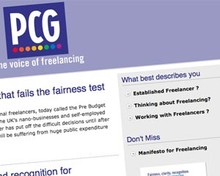
Practical elements:
Contracts
Contracts are an essential part of every freelancer’s toolkit, a contract outlines the expectations of both parties and they provide a legal framework within which these will be achieved. Contracts provide a formal definition of the business relationship between the freelancer and agency or direct client, and are vital on those occasions legal intervention is required.
It is important to agree the objectives and outcomes of the project you are undertaking – define deliverables, set timescales and negotiate costs. Most freelance journalists will use time as the basis for determining fees, because it can vary according to the variations in the scope of a project. Time is usually billed on a daily, weekly, or hourly rate. Some freelancers choose to charge a fixed price to complete a specific project, but most common is a day rate.
As a freelancer you will quickly realise that cash flow is important, and one of the best ways to improve cash flow is to get clients to pay their bills on time. Tactics ensure prompt payment include offering early discount settling and sending out invoices quickly with clear information, so that the client has no reason to query the invoice and delay payment. Chase payment tenaciously but politely, and seek advice if payment is overdue.
Who owns the copyright?
Under the Copyright, Designs and Patents Act (CDPA), the general rule is the author (creator of the work) is the first owner of copyright. However, where a work is made by an employee in the course of their employment, the employer will be the first owner of copyright, subject to any agreement to the contrary. Copyright is free and automatic. A freelancer therefore, working for a client under a contract for services, is likely to be the first owner of copyright.
Diversity
You can write and you know how the media works – so capitalise on those skills. Many freelance journalists offer media training workshops and work closely with PR consultants to help train up clients whose marketing communications plans include a media programme.
Client benefits
Remember what is in it for clients and why they should use you as a freelancer. Those freelancers surveyed by ComRes believe that it is their specialist knowledge (97 per cent); years of experience (98 per cent); enthusiasm (93 per cent); objectivity (94 per cent); innovation (90 per cent); and value for money (95 per cent) that is of real and valuable benefit to clients, and these aspects will be key to assisting the UK in returning to growth.
In a nutshell
- Freelancers offer a more flexible resource than permanent staff, they can call upon freelancers as and when they need the resource. This is undoubtedly an advantage in the current economic climate;
- Freelancers are not a burden on resources - companies do not have to pay them sick pay, holiday pay, redundancy pay or pay their NICs;
- Freelancers are well placed to take on projects that can yield quick wins (and may be on the back burner because of resource issues);
- Freelancers are well placed to drive and manage change;
- Freelancers can provide expert skills that an in-house team may not have;
- Freelancers usually bring a broad range of experience, seldom available in-house.
John Brazier is managing director of PCG, an independent organisation that represents the UK's freelance community.
Free daily newsletter
If you like our news and feature articles, you can sign up to receive our free daily (Mon-Fri) email newsletter (mobile friendly).
Related articles
- Call for views: the state of freelance journalism
- New guidelines call for the abolition of kill fees and fair payment practices for freelance journalists
- Headlines Network publishes new mental health resource on hybrid work
- 'Give freelance journalists the due respect - and money - we deserve'
- Seven tips for using LinkedIn as a freelance journalist









